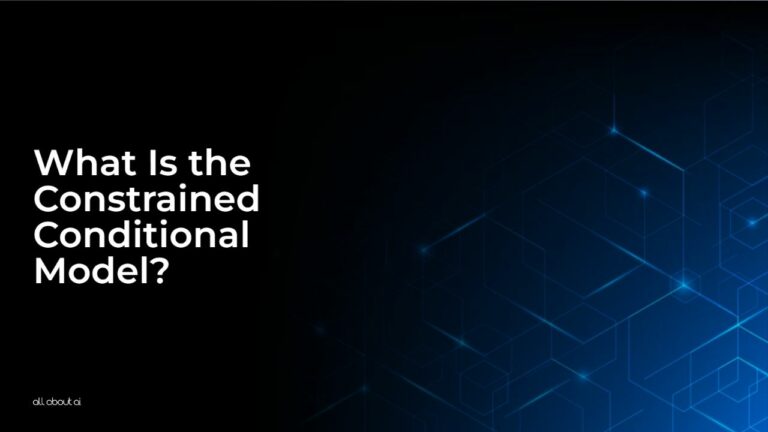What is the constrained conditional model (CCM)? In artificial intelligence, it is an advanced predictive model that applies constraints to ensure specific conditions are met. Unlike traditional models, CCMs incorporate domain knowledge and rules into the learning process, allowing for more accurate and relevant predictions in complex scenarios. This approach is particularly beneficial in fields where the data must adhere to known laws or regulations.
Looking to learn more about the Constrained Conditional Model? This article, carefully crafted by the AI gurus at All About AI will teach you all you need to know.
Examples of Constrained Conditional Model
Financial Fraud Detection: In the finance sector, AI systems using CCMs analyze transaction patterns to detect potential fraud. By setting constraints based on unusual transaction behaviors, these models can flag suspicious activities more accurately, while adhering to regulatory compliance.
Natural Language Processing: In language models, CCMs ensure grammatical correctness and context relevance. For example, an AI model, like ChatGPT, could use constraints to generate text that not only sounds natural but also aligns with specific stylistic or factual guidelines.
Predictive Maintenance in Manufacturing: Manufacturing industries employ CCMs to predict equipment failures. By integrating constraints related to machine performance thresholds and maintenance schedules, these models can forecast potential breakdowns, optimizing maintenance activities.
Smart Energy Systems: In energy management, CCMs can optimize energy distribution based on constraints like demand patterns, supply limitations, and environmental considerations. This leads to more efficient and sustainable energy usage.
Use Cases of Constrained Conditional Model
Healthcare Diagnosis Assistance: CCMs assist in diagnosing diseases by analyzing patient data against medical knowledge constraints. These models can evaluate symptoms and test results, offering accurate diagnoses while considering medical guidelines and patient history.
E-Commerce Personalization: Online retail platforms use CCMs to personalize shopping experiences. By setting constraints based on customer preferences and purchase history, these models offer more tailored product recommendations, enhancing customer satisfaction.
Automated Content Moderation: Social media platforms utilize CCMs to moderate content. By incorporating constraints related to community guidelines and legal standards, these models can effectively filter out inappropriate content.
Traffic Management Systems: In urban planning, CCMs are employed to optimize traffic flow. These systems use constraints like traffic volume, road capacity, and emergency vehicle routes to make real-time traffic management decisions.
Pros and Cons
Pros
- By incorporating domain-specific rules, CCMs often yield more accurate predictions than traditional models.
- These models ensure outputs adhere to legal and ethical guidelines, reducing compliance risks.
- CCMs effectively incorporate expert knowledge into the AI decision-making process.
- Constraints can compensate for limited or imbalanced datasets, enhancing model performance.
- CCMs offer customized solutions that align with specific industry needs.
Cons
- Developing CCMs can be more complex due to the need to define and integrate constraints.
- Over-reliance on constraints might limit the model’s ability to adapt to unforeseen scenarios.
- Effective CCMs require substantial domain expertise to set appropriate constraints.
- If constraints are not properly set, there’s a risk of reinforcing existing biases.
- Keeping the model updated with evolving domain rules and knowledge can be resource-intensive.
FAQs
What is an example of a constrained conditional model?
An example of a CCM is an AI system in healthcare that diagnoses diseases, integrating constraints based on medical protocols and patient history to provide accurate assessments.
Is constraint programming artificial intelligence?
Yes, constraint programming is a subset of artificial intelligence. It involves solving complex problems by applying specific constraints to limit the range of solutions.
How does a Constrained Conditional Model differ from traditional models?
CCMs differ from traditional models by incorporating predefined constraints, ensuring that the model’s outputs adhere to specific conditions or domain knowledge.
In what scenarios are CCMs most effective?
CCMs are most effective in scenarios requiring precise and domain-specific solutions, such as in healthcare diagnosis, financial fraud detection, and regulatory compliance.
Key Takeaways
- Constrained Conditional Models integrate domain-specific constraints, leading to more accurate and relevant AI predictions.
- They are particularly beneficial in scenarios requiring adherence to specific rules, such as in finance, healthcare, and legal domains.
- While offering improved accuracy and compliance, CCMs are complex to design and maintain.
- These models are instrumental in ethical AI development by ensuring outputs align with legal and societal norms.
- The versatility of CCMs allows for their application in diverse fields, offering tailored AI solutions.
Conclusion
Constrained Conditional Models stand out in AI for their ability to integrate domain-specific rules, ensuring accuracy and relevance. These models are pivotal in environments where outputs must comply with stringent guidelines or complex knowledge. By balancing precision with regulatory adherence, CCMs represent a sophisticated blend of AI innovation and practical application.
Looking to learn more about the AI world after getting the answer to the question, “what is the constrained conditional model?” Then explore more AI-related topics in our comprehensive AI Language Toolkit.





